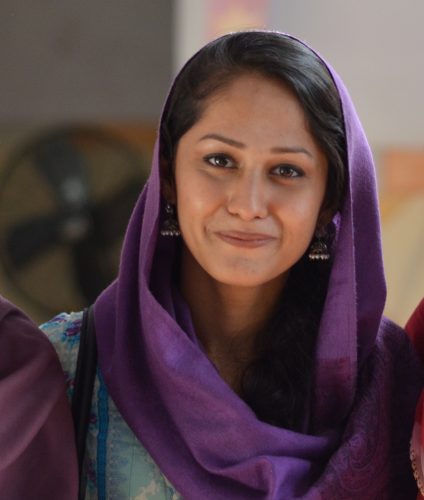Born and raised in Pakistan, Maheen Zakaria ES ’17 has loved science for as long as she can remember. In Pakistan, students decide what “track” they want to pursue in life in middle school, and without hesitation, she chose science. Her passion blossomed as she learned to connect scientific concepts to create new ideas.
Zakaria fostered her chemistry expertise through team projects, but these were not your usual science fair undertakings. By the end of high school, she had investigated wheat grass with antioxidant activity as a potential cancer therapy and developed photovoltaic cells to address the energy crisis in Pakistan, the latter of which earning her a Best of Category award at the International Intel Science Olympiad Zakaria explained that she has “always been surrounded by peers and professors who not only supported [her] interests but also pushed [her] towards challenges. In Pakistan there is a strong focus on pursuing STEM-based careers, but people don’t truly understand the power of science. The way it’s approached back at home really underestimates its potential.” Since high school, Zakaria wanted to come to the United States, with its rich funding and many institutions for scientific research, to fully pursue her intellectual curiosity.
Originally planning to pursue graduate work in chemistry, Zakaria soon found her scientific interests shifting towards medical applications. After her first year at Yale University, she conducted computational research on drug potency, and, during the following summer, investigated therapies for neurodegenerative diseases. Wanting to take advantage of the opportunities she now had, Zakaria sought to play a more active role in society. Though she still finds medical research critical, she wanted to explore potential ways of immediately helping people, especially in her home country. Zakaria designed a course for street children, to provide themwith formal education general life skills like the value of sharing and tolerance. Through this program, Zakaria was able to teach over 50 students in Pakistan, even fundraising to finance six students’ long-term enrollment in official schools.
Receiving the Davis Projects for Peace Fellowship, Zakaria returned to Pakistan in the summer of 2016 to combat domestic violence. Her project was three-pronged: developing awareness workshops for women of low socioeconomic status, organizing a theater production for men and women, and designing a website with resources that would cater specifically to the Pakistani culture. Zakaria applied the same dedication, rigorous planning, and tireless effort to these projects as she had with her science projects. Bridging her passion for public health and science, Zakaria dreams of revamping the research and STEM education landscape in Pakistan. She hopes that “one day [she] can go back to Pakistan and make people realize the magnificent ways … in which science can transform lives.”

